Is Spray Foam Good For Soundproofing? Explained
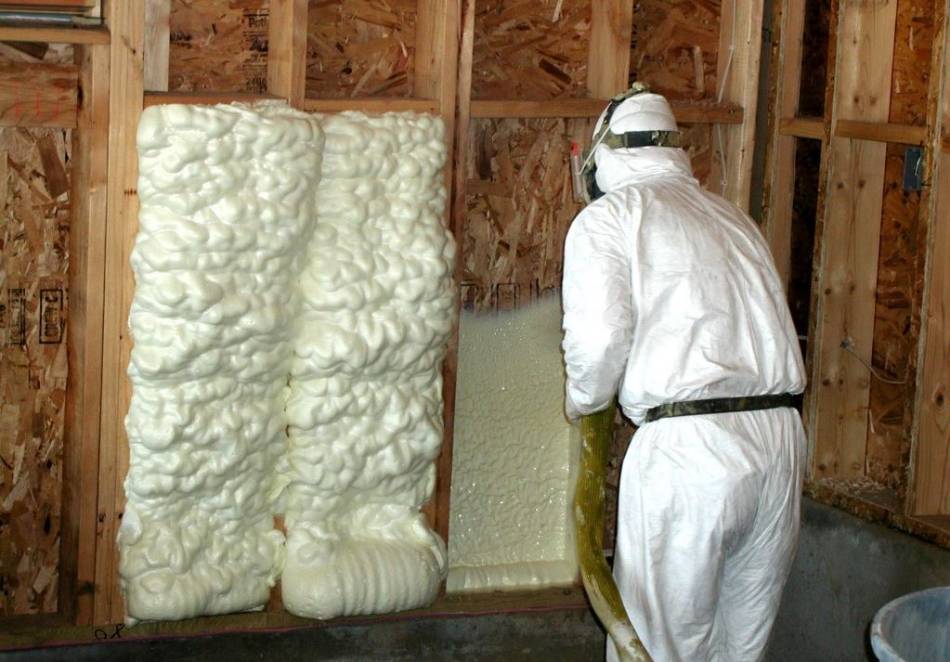
If you live in an apartment with quite sensitive walls, you will most likely have problems with noise. While external walls are usually designed to block and reduce noise transfer, internal walls are typically left hollow, creating a prime opportunity for sound to travel through the building.
If you want to add peace to your living space, consider filling the empty space with spray foam insulation. But there is one question: can spray foam effectively reduce noise transfer? In this article, we’ll talk about that. So, let’s start!
Is Spray Foam Good for Soundproofing? Spray foam can provide some level of sound absorption, but it is not the most effective soundproofing material. The foam does not offer any decoupling, meaning vibrations can still travel through the wall and the foam. Spray foam should be used with other materials for maximum soundproofing benefits.
When it comes to spray foam, it’s important to understand the differences between open and closed-cell foam insulation, as well as the advantages and drawbacks of each. Spray foam can be used for soundproofing, but it is not your best option.
Soundproofing materials such as acoustic panels, fiberglass, and mineral wool are much better at reducing noise. In the table below, you can see a comparison of spray foam vs. other soundproofing materials.
| Material | Soundproofing Level | Advantages | Disadvantages |
|---|---|---|---|
| 1. Spray foam | Fair | Provides a medium level of soundproofing | High price, not as effective as other materials |
| 2. Acoustic panels | Good | High level of soundproofing, easy installation | Not suitable for large areas |
| 3. Fiberglass insulation | Good | High level of soundproofing | Inexpensive, widely available |
| 4. Mineral wool | Excellent | Ability to absorb high and low-frequency noise | Durable, long-lasting, moisture-resistant |
Related Article: Is Styrofoam Good For Soundproofing?
How Much Does Spray Foam Insulation Reduce Noise?
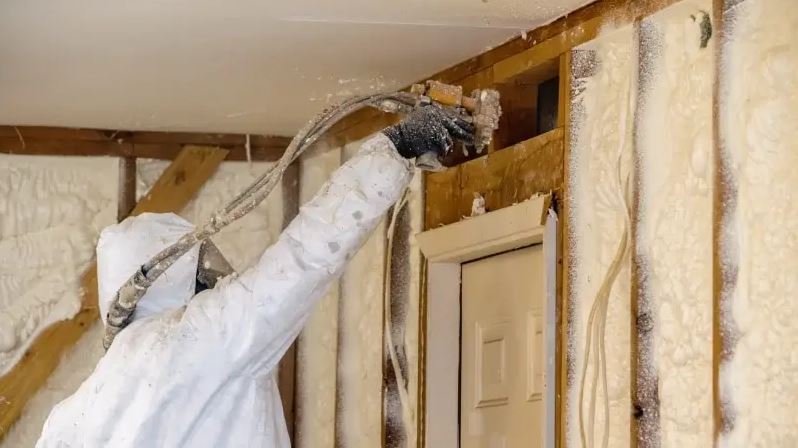
Spray foam insulation is a popular choice for both new and existing construction because of its ability to seal gaps and prevent airflow. There are two types of this foam insulation: open-cell and closed-cell.
Open-cell spray foam is better at blocking sound transmission than closed-cell spray foam, but neither is particularly effective at absorbing or trapping sound waves.
While spray foam insulation can help reduce noise transmission by reflecting some sound waves, it lacks the mass necessary to absorb sound waves and create a sound-deadening effect effectively.
Open-cell and closed-cell spray foams have some sound-blocking properties but are ineffective at reducing noise transmission.
Moreover, the spray foam can increase resonance instead of damping it. This is done by attaching it to all surfaces and then expanding and hardening, coupling the wall components together and providing an easy transfer of sound vibration. Remember that low bass and drum noises can easily travel through walls.
Other insulation options like mineral wool, acoustic panels, and fiberglass may be more effective for soundproofing, as they have greater mass and can absorb or trap sound waves more effectively. Therefore, it’s important to consider all the available options and their properties before deciding on the best insulation choice for your soundproofing needs.
Which Foam Is Better For Soundproofing? Open Cell Vs Closed Cell
The choice between open-cell and closed-cell foam is important when it comes to soundproofing with foam insulation. Open-cell foam has a porous structure that is more flexible than the closed-cell counterpart and lets in a small amount of air.
Although open-cell foam is better at reducing noise than closed-cell foam due to its ability to trap sound, its hard surface doesn’t absorb sound waves. Instead, it blocks, reflects, bounces, or resonates with them.
Related Article: Pros and Cons of Soundproof Wallpaper
On the other hand, closed-cell foam forms a more rigid and durable mass due to its closed bubble structure. While the cells provide thermal voids, the closed-cell don’t let air flow. The hard surface of closed-cell foam can stop most of the sound waves.
When Is It Best To Use Spray Foam?
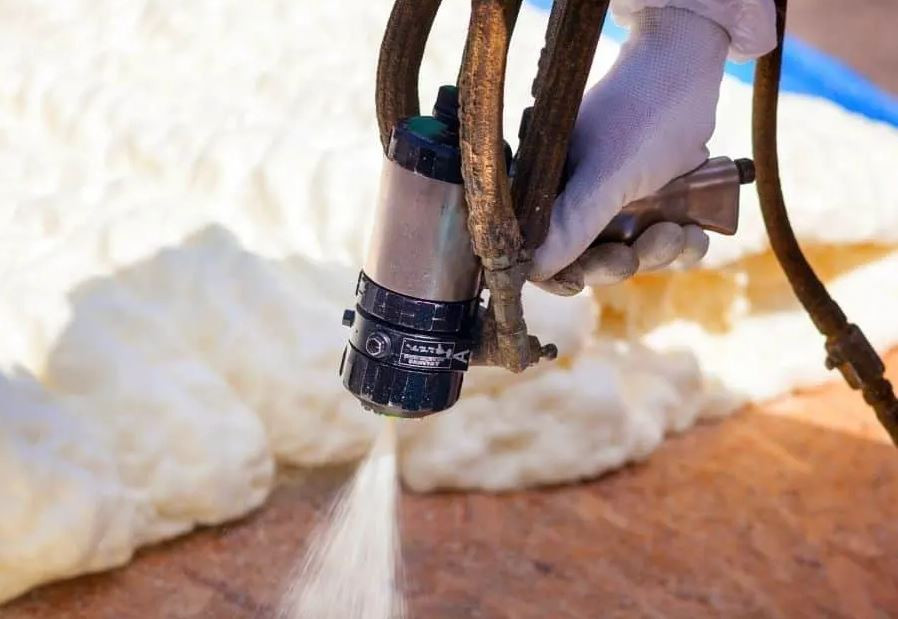
For most people, loud noise can be a significant problem. Luckily, soundproofing doesn’t have to be expensive. Spray foam is definetly a good choice for those who want to soundproof a room without breaking the bank.
Unlike other soundproofing materials, spray foam is easy to work with and can be used on already-constructed walls. However, it’s important to understand that spray foam is not always the best choice for soundproofing. If you’re dealing with extreme noise disturbances, spray foam may not be enough to solve this issue.
Overall, the benefits of using spray foam for soundproofing include its low cost and ease of use. It’s an excellent option for reducing moderate noise levels but may not be the best choice for extreme noise situations. Before deciding on spray foam, see if you have a problem with the loud noise you’re trying to block and consult a professional to determine if spray foam is the best option for your specific needs.
3 Best Spray Foam Alternatives For Soundproofing
If you’re looking for ways to soundproof a room, relying solely on open-cell or closed-cell spray foams may not be the best solution, as they are primarily used for thermal insulation. Luckily, there are other materials you can use, such as fiberglass, mineral wool, and acoustic foam, which are popular for their soundproofing abilities. In this section, we’ll go through all these methods and see which one suits you the best:
1. Acoustic Panels
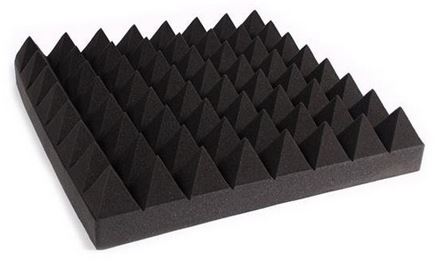
For those looking to improve a room’s acoustics, polyurethane acoustic panels are a good option. These panels are made of high-density polyurethane foam, which makes them great at reducing noise levels. Not only that, but they also provide thermal insulation, just like foam spray and fiberglass.
One of the advantages of polyurethane acoustic panels is that they are easy to install. You can install them using double-sided foam tape, making the installation process quick and hassle-free. Polyurethane acoustic panels come in various price points, so you can find an option that fits your budget.
If you’re willing to invest a little more in quality and appearance, some high-end options are available. These panels are made from eco-friendly materials. Overall, acoustic panels are a versatile and cost-effective solution for improving the sound quality of any space.
2. Fiberglass Insulation
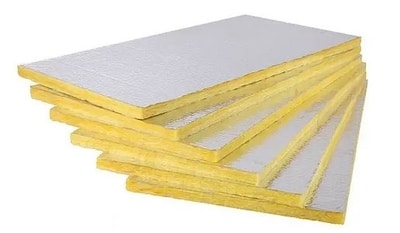
> Buy Fiberglass Insulation HERE <
Fiberglass is a popular material for sound insulation because of its highly effective insulation properties. It can prevent soundwaves from entering the room and block sounds from leaving the room. Apart from this, it also helps regulate temperature, making it an ideal choice for insulation.
One of the significant advantages of fiberglass is its ability to insulate ceilings, walls, and floors. It consists of small glass particles. Fiberglass panels are a common choice for wall insulation, providing acoustic and thermal insulation.
3. Mineral Wool
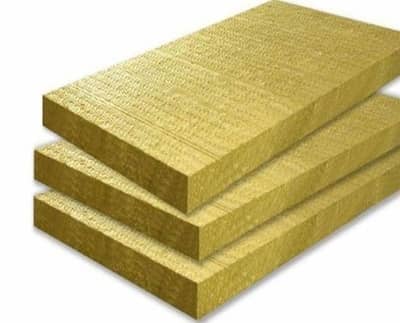
Mineral wool is a popular type of insulation material that is composed of rock-based mineral fibers. The raw materials used to make mineral wool are usually recycled slag and basalt rock, which are melted and then turned into fibers. This process produces insulation that is used for structural, thermal, and acoustic purposes.
Mineral wool is mostly used for sound insulation because it absorbs soundwaves. Its compression into rolls is also a reason for its widespread use in soundproofing. In addition to soundproofing, mineral wool has a higher density compared to fiberglass, making it more effective at blocking soundwaves.
The NRC rating of mineral wool insulation can reach 1.1, which is slightly higher than fiberglass. Mineral wool is also popular for its durability and long life, making it an affordable choice. Additionally, it is a lightweight material, which means it reduces the risk of bacterial formation.
Mineral wool is also fire-resistant, although not completely fireproof. This property makes it a popular choice for use in buildings where fire safety is a concern. Overall, mineral wool is a reliable and effective choice for insulating homes or buildings while providing soundproofing and fire safety.
Here is an interesting video where spray foam is used for soundproofing a floor.
Related Article: Can You Soundproof A Room Without Damaging Walls?
FAQ: People Also Ask
What kind of foam is best for soundproofing?
The closed-cell foam is considered a very good choice for soundproofing. This type of foam has tightly woven cells, creating a “closed” effect that results in a denser material. As a result, closed-cell foam is highly effective at absorbing low-frequency noise, making it a top choice for soundproofing applications.
Does any foam work for soundproofing?
No, not all foams are good for soundproofing. In reality, even the densest foam cannot effectively block sound from transferring from room to room. Soundproofing foam lacks decoupling, meaning vibrations will still travel through the wall and the foam.
How do professionals soundproof a room?
Professionals use various techniques to soundproof a room, but one common method is installing acoustic panels. These panels are specially designed to reduce sound reflections, which can create echoes and make a room sound louder than it is.
Final Thoughts
While spray foam insulation can effectively provide thermal insulation, it is not the best option for soundproofing. The foam material itself can block some noise, but in some cases, this is not enough. Additionally, the spray foam can act like a resonating chamber, amplifying certain frequencies and worsening the sound quality.
It is important to consider the limitations of spray foam insulation for soundproofing purposes. However, other materials and methods can reduce unwanted noise and create a quieter living space. I hope that this article has helped you.

